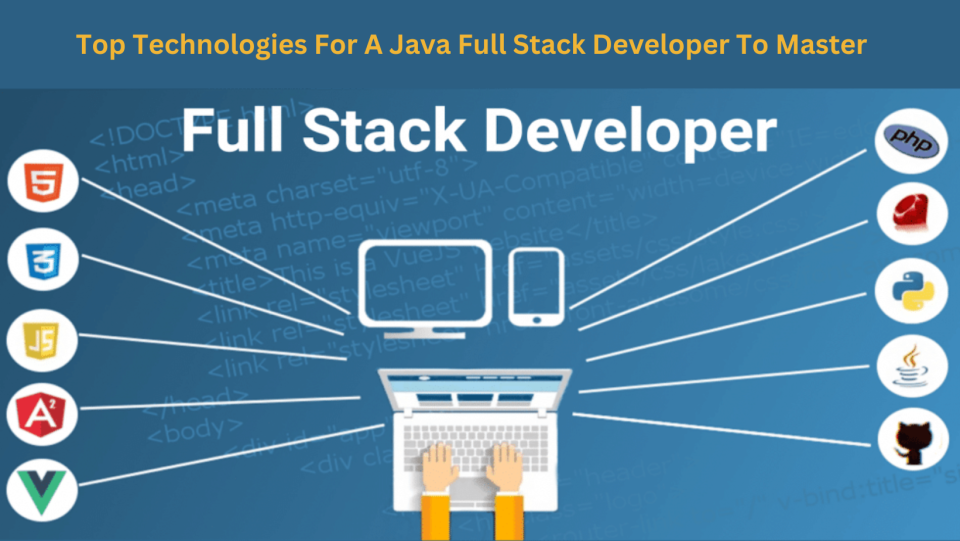Introduction
Java Full Stack technology is driving the future of cloud computing, making it easier for developers to build dynamic web applications. Its powerful combination of Java programming language, servlets, core Java, REST APIs, and other technologies is use to create full stack applications. As a result, many businesses are turning to Java Full Stack developers to help them develop their own cloud-based solutions.
The fundamentals of Java Full Stack Programming involve understanding the various layers or components involved in building a full stack application. This includes the frontend layer for designing user interfaces and creating web pages with HTML5 and CSS3, the backend layer for writing server-side code using servlets, and integration with other tools such as databases or third-party services. Security is also an important concern when developing with Java Full Stack technology. Authentication methods such as OAuth2 must be implemented properly in order to protect user data.
Benefits Of Java Full Stack For Cloud Computing
The future of cloud computing is driven by Java Full Stack, which enables developers to quickly and easily build cloud applications. Java Full Stack provides a comprehensive environment for all stages of the application development process, from design to deployment, making it an ideal choice for cloud computing solutions. Kelly Technologies offers Java Full Stack Training in Hyderabad program which is very used and also would be an apt choice.
There are numerous benefits to Java Full Stack and Cloud Computing. Deploying applications in the cloud can reduce software costs, improve productivity, and scalability. By allowing configuration changes and updating to be do in one place, operations can be streamline. Additionally, it enhances security with robust authentication methods and encryption techniques while maintaining flexibility and scalability as your needs change over time.
With a full stack development team, communication between front-end developers and back-end developers, as well as other stakeholders involved in the process, is improve. Furthermore, Cloud Computing’s distributed architecture ensures that applications remain available even if one server fails, providing greater reliability than traditional hosting solutions.
In addition, implementing a full stack solution makes it easier for different technologies or platforms, such as mobile applications or web application integration, to be possible. Maintenance becomes much easier with bug fixes and feature updates when using Cloud Computing platforms versus previous hosting models like dedicated servers. All these factors combine to make Cloud Computing with Java Full Stack Development an excellent choice when looking into developing modern enterprise-class application solutions today.
Top Technologies For A Java Full Stack Developer To Master
Java is an essential language for Full Stack Developers to master as it drives the future of cloud computing. As a Java Full Stack Developer, you must be familiar with various technologies use in the cloud and understand how they work together. Cloud-based technologies such as Docker, Kubernetes, and AWS are essential for any Java Full Stack Developer. Understanding how these tools can help deploy applications quickly and efficiently on the cloud platform of your choice is essential. Additionally, becoming familiar with Java Server Frameworks like Spring Boot, Vert.x, and Quarkus will enable you to create secure web applications quickly and easily. If you are looking for the best Java Full Stack Training in Hyderabad certification program, then look no further then the Kelly Technologies institute
Full Stack JavaScript frameworks such as React and AngularJS are also critical for a successful Java Full Stack Developer. These frameworks help build interactive user interfaces quickly and effectively on multiple devices by leveraging common web development techniques such as HTML5, CSS3, etc. It would also be beneficial for developers to learn DevOps tools such as Ansible, Chef, Puppet, and Jenkins which can automate tasks related to deploying applications on various cloud platforms while ensuring security across all platforms used in production environments.
Database technologies such as MongoDB, Cassandra, DynamoDB, and Postgres are necessary skills need by modern-day Full Stack Java Developers. Most applications require some form of persistent storage mechanism that can scale up or down depending on usage patterns. Furthermore, AI and Machine Learning libraries such as TensorFlow and Scikit Learn provide developers with the powerful tools needed when building predictive models or analyzing datasets.
In Conclusion
The article in Teriwall must have given you a clear idea of this concept. Java Full Stack is a potent technology that is propelling the future of cloud computing. It offers a multitude of advantages for businesses, including cost savings, faster deployment times, increased data analysis and IoT development, automated manual maintenance tasks, and component compatibility assurance. Furthermore, it gives developers the ability to access a variety of tools and technologies that make cloud computing more accessible. To achieve maximum success with a Java Full Stack development project, mastery of the top technologies involved is essential. Given the rapid growth in demand for cloud-based services in today’s digital world, businesses should strongly contemplate transitioning to Java Full Stack for their next project.

